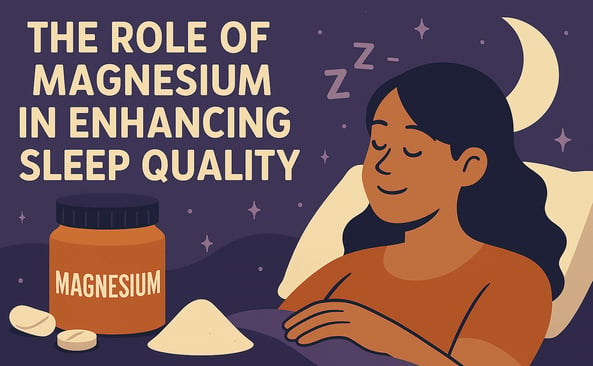The Role of Magnesium in Enhancing Sleep Quality
Magnesium is a vital mineral that plays a multifaceted role in maintaining optimal health. Often referred to as the "sleep mineral," magnesium is crucial for various physiological processes, particularly those involving the nervous system and muscle function.
4/18/20254 min read


Understanding Magnesium: The Sleep Mineral
Magnesium is a vital mineral that plays a multifaceted role in maintaining optimal health. Often referred to as the "sleep mineral," magnesium is crucial for various physiological processes, particularly those involving the nervous system and muscle function. This essential mineral contributes to over 300 enzymatic reactions within the human body, influencing functions such as energy production, protein synthesis, and the regulation of blood glucose levels.
One of the key areas where magnesium exerts its influence is on the nervous system. It is known to modulate neurotransmitter activity, particularly the production of gamma-aminobutyric acid (GABA), a neurotransmitter that plays a fundamental role in promoting relaxation. Through its calming effects on the nervous system, magnesium helps to reduce anxiety and stress, factors that can significantly hinder sleep quality. Insufficient magnesium levels may lead to increased activation of the nervous system, resulting in disturbances that interfere with the ability to fall and remain asleep.
Moreover, magnesium is crucial for muscle function, aiding in muscle relaxation. When muscle tension is alleviated, individuals are more likely to experience restful sleep. The mineral's interaction with calcium is also pertinent; while calcium stimulates muscle contractions, magnesium promotes relaxation. This balance is essential for preventing muscle cramps and spasms that can negatively affect sleep quality.
Research has indicated a correlation between magnesium deficiency and various sleep disorders, including insomnia and restless leg syndrome. Individuals with lower magnesium levels may struggle with disrupted sleep patterns, highlighting the importance of maintaining adequate magnesium intake. Incorporating magnesium-rich foods such as leafy greens, nuts, and whole grains can be beneficial for enhancing overall sleep quality, promoting a more restful and restorative sleep experience.
The Science Behind Magnesium and Sleep
Research increasingly indicates that magnesium is crucial for enhancing sleep quality, with numerous studies demonstrating the connection between magnesium levels and various aspects of sleep. Magnesium acts on several pathways that can influence sleep patterns, ultimately contributing to both sleep duration and quality. For instance, it has been shown that higher magnesium levels are associated with improved sleep efficiency and better regulation of sleep stages, particularly the rapid eye movement (REM) and non-REM phases.
Several scientific investigations have explored the relationship between magnesium and sleep. In a notable study published in the "Journal of Research in Medical Sciences," participants who took magnesium supplements reported significant improvements in sleep quality, suggesting that magnesium deficiencies could contribute to sleep disturbances. Furthermore, magnesium is known to play a pivotal role in the synthesis of melatonin, a hormone essential for regulating the sleep-wake cycle. Enhanced melatonin production may promote earlier sleep onset and better sleep maintenance throughout the night, thereby impacting overall sleep efficiency.
The mechanisms underlying magnesium's effect on sleep are multifaceted. Magnesium helps to modulate neurotransmitters that are critical for sleep, such as gamma-aminobutyric acid (GABA), which has a calming effect on the nervous system. By increasing GABA activity, magnesium may help reduce sleep latency—the time it takes to fall asleep—and increase sleep time. Additionally, magnesium supports the body’s circadian rhythms, ensuring that sleep cycles remain stable, which is essential for achieving restorative sleep.
Collectively, these findings underscore the significant role magnesium plays in sleep health. As more research unfolds, the understanding of how magnesium affects sleep quality will likely deepen, providing further insights into dietary recommendations and interventions for better sleep.
Signs of Magnesium Deficiency and Its Impact on Sleep
Magnesium deficiency can manifest through a variety of symptoms, many of which can have a significant impact on sleep quality. Individuals suffering from inadequate magnesium levels may experience difficulties in both falling asleep and maintaining restful sleep. Common symptoms associated with magnesium deficiency include muscle cramps, fatigue, irritability, and anxiety, all of which can contribute to insomnia or disrupted sleep patterns. The connection between magnesium levels and sleep is well-documented; magnesium plays a pivotal role in regulating neurotransmitters that promote sleep, such as GABA.
Certain populations are particularly susceptible to magnesium deficiency, heightening their risk for sleep disturbances. For instance, individuals with gastrointestinal diseases, such as Crohn’s disease or celiac disease, often have difficulty absorbing magnesium efficiently. Additionally, those who consume a diet low in magnesium-rich foods—such as leafy greens, nuts, seeds, and whole grains—may find themselves at a higher risk. Alcohol consumption and certain medications can also deplete magnesium levels, further exacerbating sleep issues.
The relationship between magnesium deficiency and sleep health emphasizes the importance of maintaining adequate levels of this essential mineral. Insufficient magnesium can lead to heightened stress responses, affecting overall well-being and indirectly causing insomnia. Furthermore, chronic sleep deprivation can create a cycle that perpetuates magnesium deficiency, as poor sleep can hinder the body’s ability to absorb and utilize magnesium effectively. Ensuring sufficient dietary intake is crucial for not only overall health but specifically for fostering optimal sleep quality. Through a concerted effort to understand and correct magnesium deficiencies, individuals may improve their sleep health significantly.
Incorporating Magnesium into Your Sleep Routine
To enhance sleep quality, incorporating magnesium into your daily routine can be highly effective. One of the primary ways to increase your magnesium intake is through dietary sources. Foods rich in magnesium include leafy green vegetables such as spinach and kale, nuts like almonds and cashews, seeds including pumpkin and flaxseeds, whole grains, legumes, and certain types of fish, such as mackerel and halibut. By including these foods in your meals, you can boost your magnesium levels naturally.
For those who may struggle to meet their magnesium needs through diet alone, supplementation can be a viable option. Magnesium supplements are available in various forms, including magnesium citrate, magnesium glycinate, and magnesium oxide. When selecting a supplement, it is advisable to consider its absorption rate and any potential side effects. Consulting with a healthcare professional can help determine the appropriate dosage and form that best suits your needs.
The timing of magnesium intake is also critical in facilitating better sleep. Consuming magnesium-rich foods or supplements in the evening may enhance relaxation and promote a more restful sleep. Incorporating magnesium into your pre-sleep routine can help signal your body that it is time to wind down. Alongside magnesium, adopting lifestyle changes such as establishing a consistent sleep schedule, creating a calming bedtime environment, and incorporating relaxation techniques, such as deep breathing or gentle yoga, can further enhance sleep quality.
Incorporating magnesium into your sleep routine, whether through dietary sources or supplementation, can provide multiple benefits to your overall wellbeing. It is essential to consider both the nutritional and lifestyle factors when aiming for improved sleep outcomes. By making informed choices, you can effectively promote better sleep through the thoughtful integration of magnesium into your life.
Buy our recommended magnesium supplement here https://amzn.to/4jyAv5H
